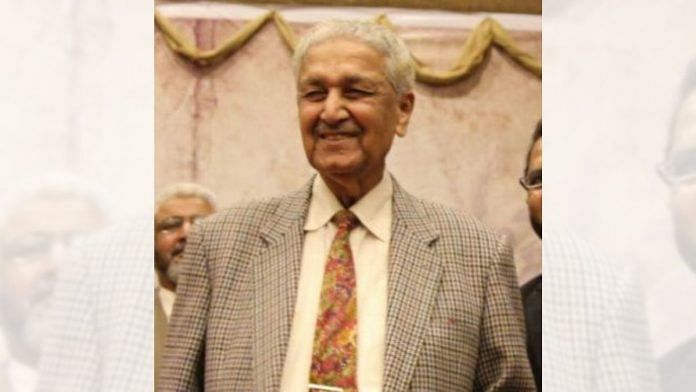New Delhi: Abdul Qadeer Khan, who was known as Pakistan’s ‘national hero’ for giving the country its first nuclear enrichment plant, passed away at the age of 85 Sunday after suffering from Covid-19.
Expressing condolences, Pakistan Prime Minister Imran Khan Sunday said he was a “national icon” who made a “critical contribution” to the country, and was instrumental in providing “security against an aggressive much larger nuclear neighbour”.
Pakistan’s National Security Advisor Moeed Yusuf called him a “true hero” of Pakistan.
Illegal nuclear dealings
Born in Bhopal, British-ruled India in 1936, Khan and his family migrated to Pakistan in 1952. A metallurgist by training, Khan began working at the Physical Dynamic Research Laboratory (FDO), a subcontractor of Ultra-Centrifuge Nederland (UCN), in 1972. UCN is the Dutch partner in the Urenco uranium enrichment consortium.
Popularly known as A.Q. Khan, his work at the FDO came under scanner of the Dutch intelligence, and finally began unravelling in 2004 when he himself admitted his illegal nuclear dealings and was also arrested for sharing nuclear technology with Iran, Libya and North Korea.
As Khan came under the Dutch intelligence radar, he was compelled to come back to Pakistan, where he was made the head of the country’s nuclear programme by then-PM Zulfikar Ali Bhutto. As Khan accepted the post, Bhutto is believed to have “thumped his fist on the table and said I will see the Hindu bastards now”. Thus began Khan’s career in Pakistan.
Khan was arrested in 2004. He was then the head and owner of Khan Research Labs. At the time, he was living in a house that he built in Rawalpindi on the shores of a drinking water supply.
In February 2004, in a televised address to the nation, Khan said he alone was responsible for running an international black market in nuclear weapon materials.
While these revelations did come as a shock to the Pakistan administration of the time, and he was put under house arrest, then-president Pervez Musharraf granted him a state pardon. Khan he was eventually declared to be a “free citizen” by the Islamabad High Court as charges against him for nuclear smuggling could not be proved.
The US, which was then ruled by George W. Bush, accepted the pardon, for it needed Pakistan in the “American hunt for Al-Qaeda” and “Pakistan lucked out once again”, wrote Vikram Sood, former chief of Indian intelligence agency RAW, in his book ‘The Unending Game’.
“Khan was not a planted spy, but fortuitous circumstances had placed the right man at the right place at the right time. Free market capitalism was in action in Europe in those days as the Pakistanis shopped for vital equipment,” wrote Sood.
In 2004, in an interview to The New Yorker, a Bush-era intelligence officer said, “We had every opportunity to put a stop to the A.Q. Khan network fifteen years ago. Some of those involved today in the smuggling are the children of those we knew about in the eighties. It’s the second generation now.”
The ‘Islamic Bomb’
A.Q. Khan did enjoy considerable support from Saudi Arabia, and through it, the larger Islamic world.
Veteran Pakistani journalist Khaled Ahmed wrote in his book ‘Pakistan’s Terror Conundrum: How the English Left India’ that Khan and his Kahuta laboratories (later known as Khan Research Laboratories after him) received massive funding from Saudi Arabia as Riyadh wanted him to develop the “Islamic Bomb”.
Ahmed noted that Khan was also seen in rallies with Lashkar-e-Taiba chief Hafiz Saeed. He used to also attend LeT gatherings with other nuclear scientists, which included Sultan Bashiruddin Mahmood, former director of the Pakistan Atomic Energy Commission.
William Langewiesche, in his book The Atomic Bazaar, noted that post his house arrest at a Los Angeles-style residence in Islamabad, Khan remained in isolation from his European wife Henny, surrounded by guards and security agents, completely cut off from the outside world.
“Khan remains an enigma,” wrote Langewiesche, “a man who may die in isolation, still carrying secrets with him.”
Also read: Abdul Qadeer Khan, man who built Pakistan’s nuclear bomb and ‘gave away secrets’
(Edited by Shreyas Sharma)



